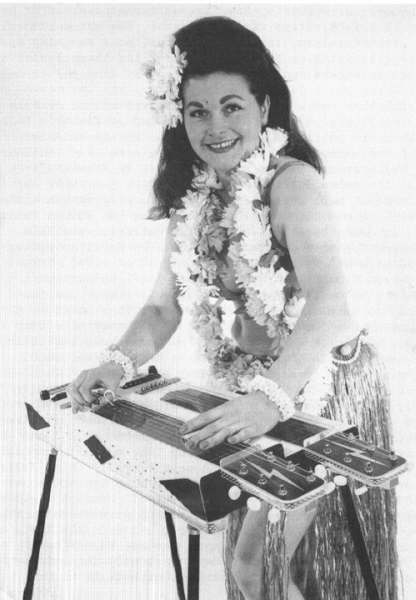The Amazing A6th
Tuning
(same as C6th with a high G
note)
Musical arrangements by David J. Stewart | Sweetnin' tabs are toward bottom
 For many years I avoided the A6th tuning, having been taught as a new player
that the A6th was used mostly for western swing, used by earlier players
such as Herb Remington and Leon McAuliffe. Since I was an E9th and C6th
pedal steel player, I avoided the A6th, errantly thinking that it was an
entirely different tuning.
For many years I avoided the A6th tuning, having been taught as a new player
that the A6th was used mostly for western swing, used by earlier players
such as Herb Remington and Leon McAuliffe. Since I was an E9th and C6th
pedal steel player, I avoided the A6th, errantly thinking that it was an
entirely different tuning.
Years later I decided to seriously take up lap steel and focus mainly on the C6th tuning since it offered the most chord availabilities and I was already somewhat familiar with the basic tuning.
I also fell in love with the B11th tuning, since it is as Hawaiian as you can get, with beautiful sounding chords (used in melodic songs such as: Sand, Hana, Mapuana, How D'Ya Do, et cetera). Barney Isaacs Jr. makes use of some great diminished chords on the B11th neck in the awesome song, Moon of the Southern Sea. He starts off playing the C6th and switches over to B11th toward the end. The B11th neck is rich in chords and I think, sadly under-played by steel guitarists today.
Although I had advanced in non-pedal C6th and B11th, I had still avoided the A6th, not having too much interest in Western Swing. But then one day I took a closer look at the A6th and realized that it was nothing more than the C6th tuning with a high G-note on top (but all the strings dropped 3 tones lower). I had been playing the Western Swing tuning all along, just without making use of a high G (or a high E in the case of the A6th tuning). Having realized that, I have begun to use the A6th tuning much more, since it offers a lower tuning with more string warmth. I love the distinct sound of a high 5th note in the scale (which is a "G" on C6th and "E" on A6th), which Herb Remington used in his hit instrumental; song, SWEETNIN'. The 5th note in any scale is also musically called the DOMINANT note. The first note is the TONIC. The 4th note of any scale is called the SUB-DOMINANT.
I could have just as easily called this webpage "The Amazing C6th Tuning," but it's the same either way (just 3 tones apart). If you tune the lowest note on the A6th up one note to a "G", you now have an A13th. This is identical to using a Bb on the bottom string of the C6th tuning. A "G" on the bottom of the A13th gives you a nice 7th chord.
I have made a very nice Band-in-a-Box track of STEEL GUITAR RAG (with real instruments, having a clean Country guitar intro and solo in the song). Here's a similar version in the key of A, but the guitar solo is different. The song is in the key of A so you can play those great open string licks. In fact, I've tabbed out the basic song for you to learn below in A6th. You certainly don't need 8-strings, 6 works just fine too. Here's a track in the key of C if you prefer C6th. Here's a version of STEEL GUITAR RAG in the key of Eb if you want to play it on the 3rd fret of the C6th tuning instead.
If you play C6th instead, with a high G note on top (i.e., string #1), then you would simply play the song on fret #9 (which is the key of A, but you couldn't play the open string licks). If you get a program called MixCraft (I have version 5.1), then you can easily transpose the track to any key you'd like without losing any quality. You can also change the tempo to faster or slower to your own musical tastes, and then mix it down as a .WAV, .MP3 or other file formats when ready.
But I hope you'll give the A6th a try. If you're used to having a high E on your C6th tuning (without the high G), then just play everything one string lower on the A6th and it's all exactly the same. You'd have to do the same thing anyway if you added a high G to your C6th tuning, i.e., now your 2nd string is E. It takes a little bit of getting used to, but it's a matter of your tastes. The big thing that I learned was that the only difference between the standard C6th tuning and the so-called “Western Swing” tuning, is the high G string on top (or in the case of A6th, a high E.). Pretty neat!
STEEL GUITAR RAG
in A6th
(plays the same for C6th)
E_________________________________________________________________
C#______________0~~_____________0~~_____________0~~~~_____________
A____________0__2~4__________0__2~4__________0__2~4~2___0_________
F#________________________________________________________0_______
E____0__0~2__________0__0~2__________0__0~2_________________0_____
C#____________________________________________________________0___
A_______________________________________________________________0_
F#________________________________________________________________
E_________________________________________________________________
C#____________________0~~___0~~___0~~___0~~~~________________0~~__
A_______0__________0__2~4___4~7___2~3___2~3~2___0_________0__2~4__
F#________________________________________________________________
E_____0____0__0~2__________________________________0__0~2_________
C#__0_____________________________________________________________
A_________________________________________________________________
F#________________________________________________________________
E_________________________________________________________________
C#________________________________________________________________
A___2~0_____________0__4~5_______5__4~2___0__________2_____2______
F#______0_________________________________________________________
E_________0_______0____4~5__5_______________0__________2_____2____
C#__________0___0______4~5____5_______________0__1~2_____2_____2__
A_____________0___________________________________________________
F#________________________________________________________________
E_________________________________________________________________
C#________________________________________________________________
A________7_____7___7~6~5________5__4~2___0___________2____________
F#_________________7~6~5__________________________________________
E__________7_______7~6~5___5_______________0___________2__________
C#___6~7_____7_____7~6~5______5______________0___1~2_____2________
A_________________________________________________________________
F#________________________________________________________________
E_________________________________________________________________
C#________________________________________________________________
A________7______________12______12________________________________
F#________________________________________________________________
E__________7______________12______________________________________
C#___6~7_____7___11~12_______12___________________________________
A_________________________________________________________________
F#________________________________________________________________
E_________________________________________________________________
C#________________________________________________________________
A__________________12______12____________12______12_______________
F#___Chorus_______________________________________________________
E____________________12_____12_____________12_____________________
C#___________11~12______12_____12__11~12_____12___________________
A_________________________________________________________________
F#________________________________________________________________
E_________________________________________________________________
C#________________________________________________________________
A__________________12______12____________7______7_________________
F#________________________________________________________________
E____________________12_____12_____________7______________________
C#___________11~12______12_____12____6~7_____7____________________
A_________________________________________________________________
F#________________________________________________________________
E_________________________________________________________________
C#________________________________________________________________
A__________________12______12____________5______5_________________
F#________________________________________________________________
E____________________12_____12_____________5______________________
C#___________11~12______12_____12___4~5_______5___________________
A_________________________________________________________________
F#________________________________________________________________
The tabs aren't exact. The song can be played different ways. You might desire using
the higher strings rather than the lower as I did. Whatever your ears like to hear
is all that matters. Here's the last part.
E_____11~12____6~7____1~0__________11~12___________________________
C#____11~12____6~7____1~0__________11~12___________________________
A_____11~12____6~7____1~0____(or)__11~12___________________________
F#____11~12____6~7____1~0__________11~12___________________________
E_____11~12____6~7____1~0__________11~12___________________________
C#____11~12____6~7____1~0__________11~12___________________________
A__________________________________________________________________
F#_________________________________________________________________
Here's an alternative chorus you might find interesting. I like to throw it in somewhere.
E______________________________________________12~~~~~~~~_________
C#________________________________12____________12~~~~~~~_________
A_____________________________12__12__14___12____12~~~~~~_________
F#________________________12__12__12__14___12_____12~~~~~_________
E___Alternative____11~12__12__12__12_______12______12~~~~_________
C#__Chorus_________11~12__12__12______13___12_______12~~~_________
A__________________11~12__12_________________________12~~_________
F#_________________11~12______________________________12~_________
E_________________________________________________________________
C#________________________________12______12______________________
A_____________________________12__12__12__12__12__~15__15__14__12_
F#________________________12__12__12__12__12__12_______________12_
E___Alternative____11~12__12__12__12__12__12__12__~14__14__13__12_
C#__Chorus_________11~12__12__12______12______12__~14__14__13__12_
A__________________11~12__12______________________________________
F#_________________11~12__________________________________________
I realize in the preceding tabs that it's not possible to exactly place the bar on
both strings 5 and 6, but I play this diminished chord all the time. It has a distinct
sound to it. I oftentimes will slide up or down 3 frets, but in four moves of the bar. It
may not be musically correct, but it sounds great. Since you're dealing with a non-pedal
instrument where bar slants are the only way to obtain many chords, anything goes. If it
sounds good, do it! I encourage you to experiment a lot.
E_________________________________________________________________
C#________________________________12______7_7_7___6_6_6___5_______
A_____________________________12__12___7__7_7_7___6_6_6___5_______
F#________________________12__12__12___7__7_7_7___6_6_6___5_______
E__________________11~12__12__12__12______________________________
C#_________________11~12__12__12__________________________________
A__________________11~12__12______________________________________
F#_________________11~12__________________________________________
Here's another alternative chorus that uses arpeggio notes, which works well with
these rhythm tracks. I didn't tab it all the way, but you go back up to the 12th
fret to repeat it and then down to the 5th fret to finish this run (in the same
arpeggio manner as shown in the tabs). Just follow the timing of the song. It's
uniquely different than what is usually played in the chorus, but sounds very nice I think.
Remember that everything that you can play on A6th can also be played on C6th if you have
a high G on top. If you only have a 6-string lap steel, you can still use a high G, just
leave off the bottom "C" note. If you're using proper string gauges, there shouldn't be a
problem tuning your 6th string up to an E. But if you're using a .050" string, then you'll
likely break something on your guitar or the string. Use the standard .036" string gauge.
E___________________________________________12_________________7__
C#___________________________________12___12_______________7__7___
A_____________________________12___12___12_____________7__7__7____
F#_____________________12___12___12________________7__7__7________
E____Alternate_______12___12______________________7__7____________
C#___Chorus_____11~12__________________________6~7________________
A_________________________________________________________________
F#______________ARPEGGIO STYLE___________________And so forth...__



